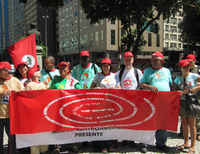WAI Dakar: Paving the Way to the Via Urbana
Riding on the success of the call for the creation of a joint and solidarity platform for urban social movements, which was supported by 380 signatories from 42 countries, the Madrid Declaration (2008) highlights the breadth of this challenge by proposing a World Assembly of Inhabitants, to take place at the WSF 2011 in Dakar.
The main target of this idea, which stems from a process supported by the IAI, is the reinforcement of inhabitant status as they defend their right to housing and to the city. The implementation of this plan is to be without borders, just as the global crisis itself respects no borders as it affects everything and everybody, down to the very last stone and the very last inhabitants of a working-class neighborhood. Its foundations, then, are nothing new, but at the same time they demonstrate that a notable qualitative and quantitative evolution has taken place since the Assembly of Pobladores (Mexico, 2000).
The WAI will fight for a new kind of inhabitant, one who is already deeply woven into the local social fabric, who is quite aware of the global challenge, who is capable of participating in the fight for collective rights and who is willing to shoulder the burden of responsibility that comes with the more active role of "city-builder" as opposed to mere user-client within a territory.
To this end, taking into account the failure of the neoliberal model whose many victims include over one billion homeless or badly-housed, without counting the 70 million people who suffer each year as a result of threats and evictions, a new Urban Social Pact is inescapable, and is based this time on human and environmental rights - in other words, another possible world. To clarify this, 'right to the city' should translate into zero evictions, 'right to housing' into public, cooperative services and direct interventions, and 'urban policies' into the inclusion of inhabitants in all decisions.
So, let us welcome, at the founding of this proposal to the Urban Convergences at the WSF in Belem, the leading international networks within this field (including HIC, Centro Cooperativo Sueco AL, COHRE, LOCOA, Dignity International, SELVIP, PPEHRC, Habitat para la Humanidad AL, ENDA TM, FNRU ), as well as to the Local Authority Forum and several universities, signing up to be a part of this process.
The WAI is structured from below and supported by a multidimensional process of exchange of experiences, strategy sharing, initiative building and a fight for resistance and for alternatives which stretch along all geographical horizons. It is for this reason, following its confirmation by the whole of the Urban Social Forum in Rio in 2010, that the initiative has taken on an air of determination, aided by the creation of Unitary Steering Committees at regional and local level, particularly at Social Forums (FS EEUU in Detroit, FSE in Istanbul, FSA in Asuncion) and other events around the world, including Bangalore for Asia, Moscow for Russia, South Africa and Cameroon.
It is the primary responsibility of these Unitary Steering Committees to bring forth g-local inhabitants, their contents and the format of the WAI, as well as an agenda leading up to and following on from Dakar, including a partnership proposal which would encourage as large a participation as possible and any necessary follow-up.
The meeting in Bobigny during the International Days for the Right to Housing in October, signed into effect the emergence of this new collective subject which will develop and make decisions.
This subject deserves finally to be seen and to have its voice heard, and this will now happen, thanks to 'Inhabitant Memory', a multi-media tool based around video interviews and organized by the Urban Popular University, which will accompany and systematize the WAI process.
From these foundations, which recognize the independence of inhabitant organizations across the board, partnerships and alliances may be built. From these foundations, as underlined in the preparatory phases of the WSF, it will be possible to share this process with Dakar's inhabitant organizations, who are open and willing to welcome the WAI in order to discuss how to respond to evicted from working-class neighborhoods with allies, as opposed to constantly feeling on the edge of a group of 'no-global', who pop up in any given place at any given time.
To summarize, this is not to be a solemn mass but rather a commitment to the building of a dialogue between inhabitant organizations and any other bodies who adhere to these same principals, be they NGOs, institutions and universities: destination right to housing and to the city, without borders.
Let us welcome the WAI, one step of a continuous and sustainable process which is already leading the way beyond the horizon of Dakar: the Urban Way.
Riferimenti geografici
Il(la) Traduttore(trice) Volontario(a) per il diritto alla casa senza frontiere dell’IAI che ha collaborato con la traduzione di questo testo è


